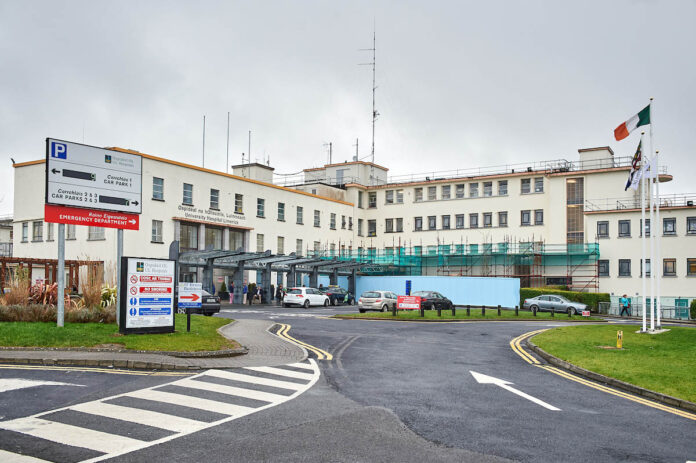NATIONAL HSE chiefs have defended the controversial removal of 24-hour Emergency Care from Ennis and Nenagh Hospitals following claims University Hospital Limerick is a “centre of death” and a “centre of disaster” for some patients who were left lying on trolleys.
The latest criticism of this downgrading came at a Joint Health Committee meeting on Tuesday just days before thousands of hospital campaigners are expected to attend a major protest march in Limerick from Merchants Quay this Saturday.
Deputy Cathal Crowe paid tribute to the frontline staff that have worked very hard to keep the hospital system some way functional.
“There has been a perpetual crisis in the Mid-West and in particular UHL. We have a population in the mid-west of almost 500,000. There was a time when this population had five Emergency Care Departments, patients were provided with a level of care were discharged and went home.
“Sometimes old ways are better. I think it is time the HSE fess up to the decision that was taken in 2009 to wind back Accident and Emergency in Ennis Hospital and downgrade services has come back to haunt us.
“Minister Mary Harney at the time touted centres of excellence. We have never had a centre of excellence in the Mid-West – a centre of death and a centre of disaster for some people is what we have seen on trolleys, a 16-year-old girl losing her life in the days before Christmas on a trolley in UHL.”
Deputy Crowe asked HSE Chief Executive Officer, Stephen Mulvany if he believed that it was a mistake to remove around the clock cover from Ennis and Nenagh Hospitals in 2009 to the point where most of the emergency care for a population of almost 500,000 is funnelled into just one hospital at UHL.
“Has this been a failure, has this been a mistake and do we need to reverse this?
Mr Mulvany said removing emergency services from smaller hospitals sites was not the wrong thing to do as it was government policy at the time and if he was managing acute hospitals services directly, he would not reverse it now.
However, this was different to the requirement to invest in Model Two Hospitals like Ennis Hospital to provide as much care to patients safely, but expecting Ireland could have 29 Emergency Departments in the country and staff them safely is “just not a practical reality”.
HSE Chief Clinical Officer, Dr Colm Henry said it isn’t possible to provide the qualified staff for a full range of specialities right up to and including intensive care in all acute hospitals.
“To revert to opening full Accident and Emergency facilities in Model Two hospitals and trying to meet the expectation you can provide the full range of care up to intensive care is not realistic.”
Acknowledging the decision to allow ambulance personnel to transfer non-critical patients directly to Ennis Hospital with the support of a senior clinician in the Medical Assessment Unit (MAU) has helped to ease the over-crowding crisis somewhat, Deputy Crowe asked if the HSE would consider introducing 24-hour MAU and Local Injury Units in hospitals like Ennis.
Deputy Crowe also pointed out the overcrowding crisis in the Mid-West isn’t temporary, it is ongoing and incessant.
Dr Henry said the HSE didn’t want to create an expectation that Model Two Hospitals had the capability to deal with complex care. Instead, the focus is on ensuring ambulance personnel can identify patients that can be brought safely to Model Two Hospitals.
HSE Chief Operations Officer, Damien McCallion said there are two national reviews underway examining the possibility of extending services at MAU and LIU, which should be completed in the near future and this would inform their policy for next year.
Deputy Crowe claimed in the summer of 2020 UL Hospitals’ Group management moved off the Dooradoyle campus to an office block about two kilometres away.
“They have no day-to-day oversight and they don’t walk the corridors. They are in an office unit that is remote from the office campus. Is that right?”
Mr Mulvany said he presumed management moved off-site to free up clinical space, but he recalled meeting management in the hospital recently during a site visit.
While Deputy Crowe said he didn’t expect management to be involved in every clinical decision, he claimed it instilled confidence in a large volume of staff to have the chief executive officer, Professor Colette Cowan and all her clinical management team walking the corridors at certain time of the day.
“They need to go back to the hospital campus where they were located for a long time,” he said. Mr Mulvany said there is a management team on the ground, while a site manager was recently appointed for UHL.
Speaking at a Joint Health Committee meeting last September, Professor Colette Cowan replied management were on site for three or four years when she first took up the CEO position eight years ago but moved out because clinical teams had no space to work out of. As CEO, she stressed she runs six hospitals not just UHL.
“We are on-site all of the time. All of my team go up and down to UHL three or four times a day. We hold our meetings there in the boardroom. All of the staff know me personally by name and we walk through the system.
“Management teams at the most senior level run UHL. We also have a head of service in there now,” she stated. Deputy Crowe expressed concern that 972 fully trained Irish doctors have emigrated over the last three years and proposed doctors and nurses should be incentivised with on campus accommodation following graduation for a period to improve the retention of medical staff.
Mr Mulvany acknowledged the health service is losing too much staff and is trying to address this by improving staff levels and training more staff.
Deputy Crowe asked if the HSE would be open to using hotel accommodation across from hospitals to provide in-patient beds that take a long time to build. In advance of the provision of elective-only hospitals, Mr Mulvany said they would consider this option where it is safe to do so.
Senator Martin Conway remarked one thing missing from Mr Mulvany’s opening statement was an apology to the thousands of patients who were left lying on trolleys in recent weeks.
Mr Mulvany then apologised for the condition that patients on trolleys are and have experienced and for staff providing care in difficult circumstances.
He rejected Senator Conway’s assertion that the HSE’s response to the winter overcrowding crisis was “lacklustre to say the least” as the increase in respiratory illnesses was well in excess of their most pessimistic health modelling. Senator Conway asked why did the HSE wait until December 22 to active its emergency response.
Notwithstanding its Winter Plan, Mr Mulvany recalled around December 22 it became clear the situation around respiratory illnesses was far worse than anticipated. Senator Conway asked why the UL Hospitals’ Group has only commissioned five in-patient beds in a private hospital, despite the fact it is regularly the most overcrowded acute hospital in the country.
The HSE Chief said UHL had made good progress reducing trolley numbers since its declaration of a major internal incident earlier this month.
Mr Mulvany pointed out the private hospital system is largely geared towards providing elective surgery and was different from the public hospital system as it doesn’t deal with medical patients in the same way. He explained some of this issue is related to geography as private hospitals tend to be located in urban areas and it could be a case there were no suitable beds in the region.
In response to Clare Champion queries, a spokesperson for UHL Group said, “An evaluation of the new pathway involving MAU physicians and partners in the National Ambulance Service (NAS) will be necessary before a decision is made on any expansion of the service.
“Off-site accommodation is an appropriate solution for staff working in hospital group shared services and for the group executive. These moves have freed up office space in UHL for consultant physicians and surgeons, advanced nurse practitioners and clinical nurse specialists, medical secretaries and nurse management among others.”
East Clare correspondent, Dan Danaher is a journalism graduate of Rathmines and UL. He has won numerous awards for special investigations on health, justice, environment, and reports on news, agriculture, disability, mental health and community.




